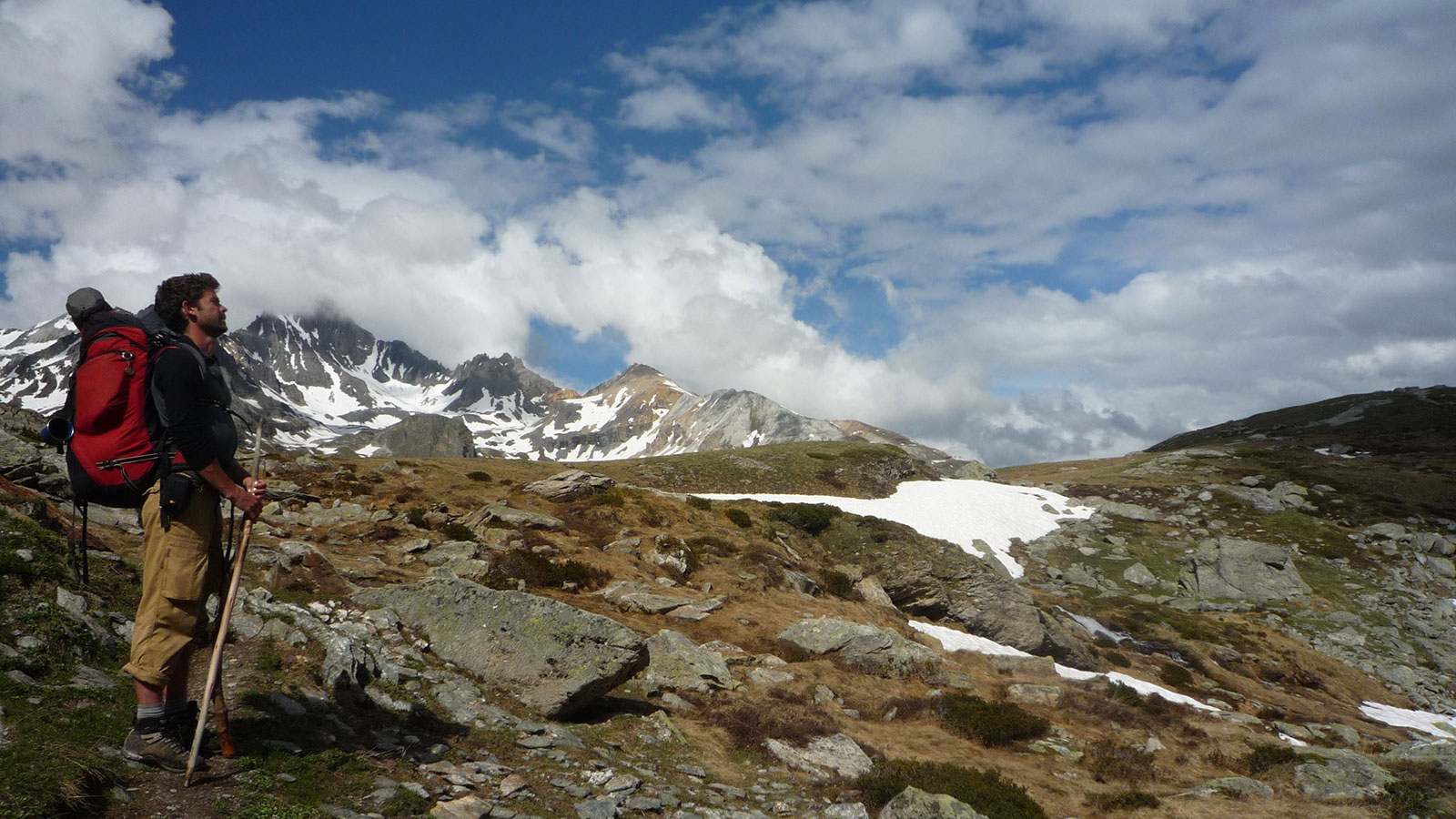It took me 247 days to walk from England to Istanbul — 3,500 miles. Flight time would have been about four hours.
I used to fly often, but gradually, insidiously, my awareness of climate change had been growing. Flights were becoming more tinged with a guilt that the carbon-offset websites seemed to only temporarily alleviate, and the changes I was making in my personal life seemed inadequate to the scale of the problem. Before long I found myself standing on the roof of the Scottish Parliament, hanging a banner protesting proposed runway expansions across Scotland. As the police and the television cameras stared up at us, I realized that flying was going to be difficult to justify to myself from that point on.
Yet travel was important to me, and I wanted to see if it was possible to have comparable adventures without flying. In early 2010, with the trees still bare, I left my home and took the first steps on a journey whose challenges and rewards I could scarcely have imagined.
From London I passed through Canterbury and stood on the worn stones at Thomas Becket’s tomb where countless pilgrims had stood before me. I crossed the Channel and walked through the storms of northern France, and from Paris I followed the Seine to Dijon as winter finally turned to spring. The hills began to rise until the Alps surrounded me, the snow still thick on the ground in May. For weeks I made my way through them, climbing to almost impenetrable passes, until finally I emerged into Italy, and into summer. As I descended the slopes, yellow acacia trembled in the wind and I stopped to pick the first wild strawberries of the year.
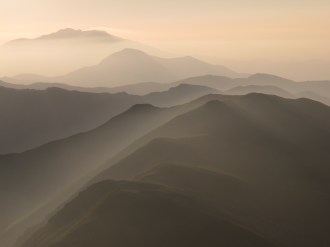
The Apennine Mountains of Italy.
One idea behind the walk was to put myself out in the world in the most simple way I knew and see what happened. A vicar’s daughter said to me that that was how she thought of faith. Certainly I found that a faith in strangers gave me a way into peoples’ lives that I had never found before. Every day I was looked after by the generosity of strangers to an extent that I had never expected before I set out. I was invited into peoples’ houses for coffee, for a Sunday lunch, for a bed. I was allowed to sleep in barns, in churches, and in mosques. And I was shown friendship at times when I really needed it. As an outsider, I began to see how crucial those interactions were. And I started to wonder whether efforts to eliminate risk are destroying the things that can really keep us safe, things like a strong community and an openness to strangers.
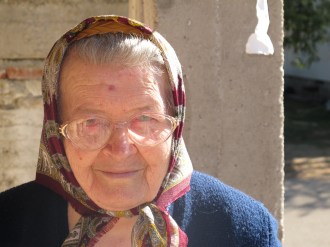
A Croatian woman living in a house still burnt out from war.
Every national border was heavy with distrust, yet each new country welcomed me ever more openly. As I entered Croatia, the customs official sat me down and toasted my arrival with rakija, the ubiquitous local spirit. It felt very far from England. I walked through dusty mountains that hid wolves and bears, skirting the edges of minefields. Ottoman influences entwined with the Catholic, and my days were punctuated with the call to prayer drifting across the landscapes. Everyone had stories to tell about the Yugoslav wars, had fought in the wars themselves or knew someone affected by them.
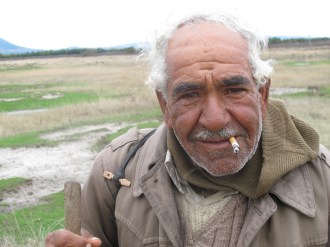
A shepherd who shared his lunch with me in Macedonia.
Maps became harder to come by, but it was mattering less. With barely any fences, I could point my compass and walk, getting directions from the shepherds. Author Rebecca Solnit suggests that the mind works at three miles per hour. We have evolved to engage with the world at this pace, and anything faster is in some ways a reduction. I followed old pathways and donkey trails, routes trodden through the mountains that had been worn by the shepherds and armies and wanderers before me, lines that spoke of human habit and an intimate connection with the land.
A preoccupation with speed is severing those connections. And without them it becomes easier to desecrate the environment guilt-free. I began with an idea that walking forces you to engage with everyone and everything that you pass. Yet I quickly found that this is not always a pleasant experience. There are places so humanized that they are no longer human-sized. Vast fields of wheat or oilseed rape, the land so bare of trees that you can scarcely stand in the winds. Villages where the communities have long since disappeared under the advance of second homes, commuters, and agribusiness, the cafés and schools now closed. The sprawl as I walked in and out of cities: business parks, car showrooms, shantytowns. Places we can only see comfortably through the eyes of a machine, moving at a machine’s speed.
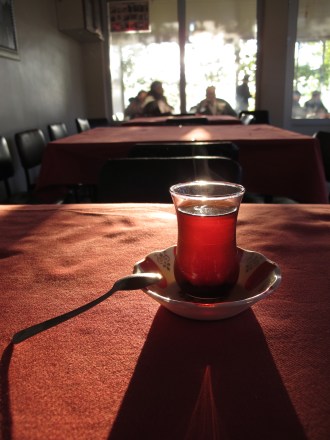
Early morning in a café in Turkey.
I realize that not everyone can set out tomorrow on a year-long walk. I have told my story merely to kindle ideas of what might be possible, of how travel today might differ from its previous incarnations and how our planet, and we ourselves, might suffer as a result. What if systems were in place to allow everybody to take a long walk at some time in their life? It is not entirely fanciful. The Camino de Santiago in Spain has a system of cheap and free accommodation that allows pilgrims to walk according to their means, and the number of walkers is increasing exponentially, from 7,000 in 1991 to 183,000 in 2011. The Flemish organization Oikoten offers young offenders the chance to walk to Santiago de Compostela from Belgium, with a mentor, as an alternative to being locked in an institution, and it has had a remarkable degree of success.
The summer was fading, the nights were getting longer, and I was eating walnuts and apples from the trees, instead of the cherries and figs of summer. One morning in Bulgaria I woke with ice coating the inside of my tent. I rushed through the last mountains of Eastern Europe as autumn mists drew in across the pines.
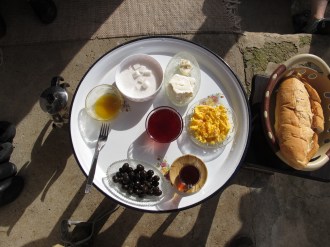
Turkish hospitality.
Eight months after I left England, I arrived in Istanbul, having gone through 12 countries, three seasons, and two pairs of boots, at a speed unchanged since humans took their first steps out of the forests. I sat down on the bank, watching Asia and the ships cutting back and forth along the busiest shipping lane in the world. From across the Bosphorus blew warm winds that spoke of deserts, and I felt as though, finally, I had arrived.
This post is adapted from a chapter in the new book Beyond Flying: Rethinking Air Travel in a Globally Connected World, edited by Chris Watson. All ongoing royalties are being donated to Friends of the Earth.

